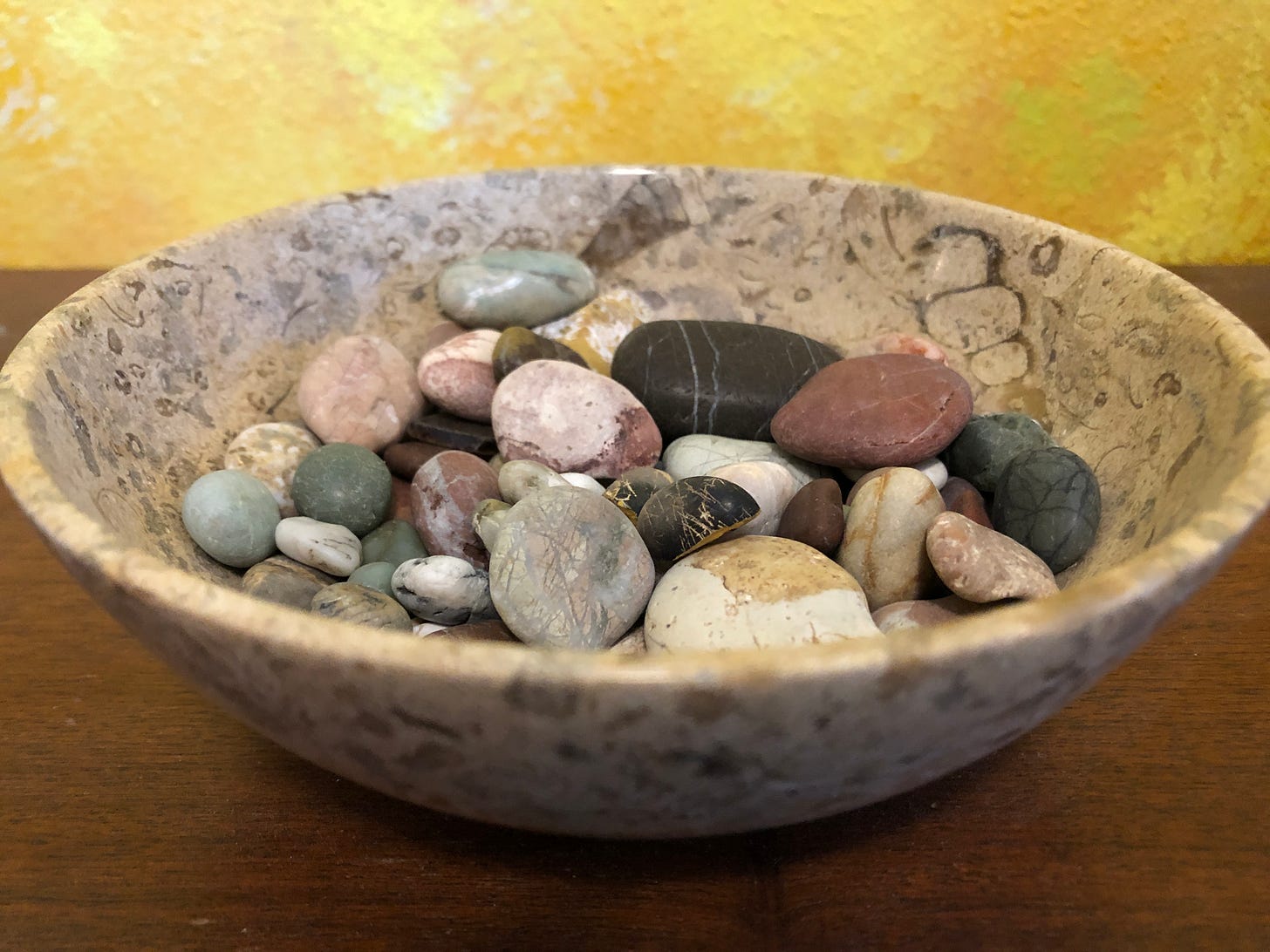Metamorphic Pebbles
“Arrange whatever pieces come your way. Never be unseated by the shying of that undependable brute, life...” —Virginia Woolf
To think that Virginia Woolf wrote the diary entry above1 while she was working on To the Lighthouse—a book that, when I read it in 12th grade, ripped apart my view of what writing and books were about and replaced it with an entirely new world, different from anywhere I’d ever been before.
The June just past was, for me, centered around health in its many guises—from healing to hospice. My own surgery, which relieved three months of miserable pain, came in the midst my mother’s hospitalizations. She is now in hospice care and, as of today, continues to be sustained by love and good care, even her failing heart.
Celebrating Mom’s 92nd birthday by crowding around her bed with all of my immediate family and then some was a delight that sustains me.
On my bookshelf sits this bowl carved from fossil-rich stone, filled with pebbles from Lake Superior, no two alike. Rocks lure me in with the fascinating tension they hold between their cultural meaning as something solid, unmoving, unchanging (solid as a rock; that person is my rock; rock hard, etc.) and the stories they tell of unfathomable heat and pressure, extremes of change across eons, and forces that raise whole mountain ranges.
Even to write “rocks” feels unjust. As with “trees” or “people,” anything said is at best a generalization. Breaking them into the three families we’ve made for them—igneous, sedimentary, metamorphic—doesn’t help a bit.
This bowl of rocks might represent the pieces thrown my way in recent months by that undependable brute, life, which will have its way with us.
I was regretting not having published a new essay here last month (my first miss since launching this newsletter). But rolling these stones around in my hand, I am comforted by the shadows of story I can make out—how deep underground this one must have been for its source magma to cool so slowly that such large crystals grew; the fracture in that one, which allowed a thread of oxygen-rich silica to intrude and harden into bright quartz.
So here are two poems—two metamorphic pebbles, if you will—inspired by my mother. Both are part of the draft manuscript for my second book, a hybrid collection called Straddling the Rift Zone.
The first poem dates from the hot, pandemic summer of 2021 when Mom was hospitalized with a transient ischemic attack (TIA, or mini-stroke). Hospitals in many places were overwhelmed with too many patients and not enough staff. We were lucky they could take her. It was first published about a year ago in the magazine Radix.
***
During the Pandemic, an Emergency Room Makes Space for My Mother
Palm fronds dance a mad,
intoxicated flamenco to surf’s
relentless beat. Wind calls the moves.
Turtles—a mass hatching—
scramble toward storm-rent refuge,
flying green foam. Months ago
elders left their trace, swimming now
in a different season’s salt.
Palette of aqua, olive and quartz.
White-black seabirds feast on hatchlings
navigating vast tangles of weeds ripped
from holdfasts, spit upon the shore.
Tomorrow under a quiet sky, waves
will lap the empty sand. Walls
of pale brick bake in the sun.
Glass doors release conditioned air.***
This next poem is published for the first time here.
***
Leave Again Oh Pensacola, your fire clouds, fire fish, bonfires. Your skimmers and moon shells. Your moons. Cousins. Holidays. The houses Gramps built. I done moved to the country three times, and the city keeps catching up. Red dirt road from the school bus to the first one—almost downtown now—where Mom and her sisters grew beautiful on fish from the bayou. The next house he built still huddles by the bay—hurricane weathered, crowded by trophy homes. I’d float till the waves rocked me at night the way Mom had, colic-desperate. My own children once splashed on that storm-stolen shore. His last house sold now, we rent places and sink our toes deeper into crystal sands of family. Sunset paints fire on storm clouds, leaving. ***
Caughie, Pamela L., Nick Hayward, Mark Hussey, Peter Shillingsburg, and George K. Thiruvathukal, eds. Woolf Online. Web. Accessed 7/3/24. <http://www.woolfonline.com/?node=content/contextual/transcriptions&project=1&parent=41&taxa=42&content=6303&pos=7>.



Beautiful, moving piece.
Kelly, your work astonishes me every time I read it. Its depth, its beauty, its connectedness.